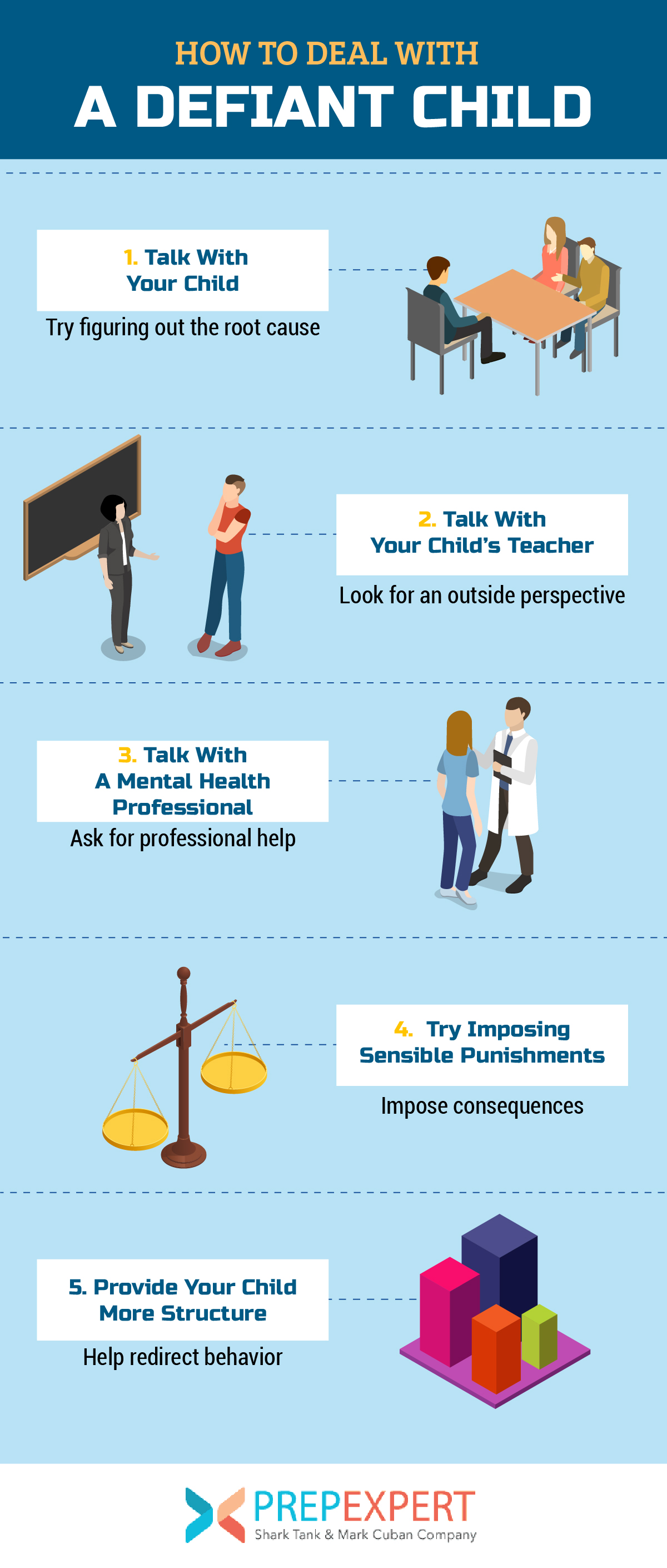How To Deal With A Defiant Child
As a parent, you can expect some poor behavior on the part of your child every once in awhile—acting out is a part of children’s processes of maturing and becoming adults. However, if your child’s behavior gets out of hand or fails to improve over a significant period of time, there are some steps you can take to deal with the situation.
The best way to deal with a defiant child is to talk with him or her about why he or she is acting out and try to find a way to fix the behavior. If you can’t get an answer from your child, you might try talking to their teacher or a professional.
If your child is having difficulty with standardized test prep, consider signing him or her up for an SAT prep course or ACT prep course with Prep Expert.


Talk With Your Child
Talk to your child and try to figure out the cause of, as well as a solution for, the bad behavior.
The first step in dealing with a rebellious or defiant child is talking to the child to figure out the root of the problem. If your child is acting out at school, perhaps it’s because he or she is being bullied or is feeling overwhelmed by schoolwork. If your child is acting out at home, maybe it’s because he or she is feeling neglected and simply wants to spend more time with you.
If your child is resistant to talking with you about the root of their bad behavior, find indirect ways to ask about it. Try taking your child out to lunch or on a drive and simply asking what’s on his or her mind. Don’t frame it as your investigating the poor behavior—just have a conversation with your child.
Maybe there’s a reason for your child’s behavior, but they’re too embarrassed to talk about it. Make them feel more comfortable opening up by opening up to them about the difficulties you faced as a child. This might make your child feel more understood and help him or her talk to you about their difficulties.
If your child does open up to you about the reason he or she is acting out, thank them for being honest with you and then help them come up with ways to change their behavior. For example, if your son isn’t doing his homework because he feels like he never gets to do the things he wants—play video games, run around with his friends outside, et cetera—help him set a schedule of times after school to do homework and times to play. Or, if your daughter isn’t doing her homework because it’s too hard for her, figure out a way for her to get extra help—either from you, a classmate or a teacher.

Talk With Your Child’s Teacher
Have a conversation with your child’s teacher about the poor behavior—they may be able to shed some light on the cause and suggest solutions.
Parents are typically informed when their children are acting out at school. However, if you’re notified of your child’s poor behavior by a teacher or administrator, make sure that you reach out to them to talk more about your child’s behavior. Chances are good the school has dealt with similar situations before, and will have suggestions about how you and your child can make improvements.
It’s also important to not instinctively take your child’s side against the teacher when the child is reprimanded or singled out for bad behavior. As a parent, you might be tempted to defend your child or shield him or her from criticism. However, unless there is a strong reason to believe otherwise, you should implicitly trust your child’s teachers when they report bad behavior—to do otherwise is to jeopardize you and your child’s working relationship with the teacher, and to deprive your child of an opportunity to grow and mature.
[leadmagnet_five]
Don’t be afraid to check in with your child’s teacher even if you haven’t heard about any poor behavior. If your son or daughter is behaving badly at home, there’s a good chance their teacher might be able to shed some light why the child acts or the things he or she says during the school day. The teacher might tell you, for example, that your son or daughter seems depressed, or has stopped talking with a classmate with whom they were once close.

Talk With A Professional
Consulting with a therapist or other mental health professional about your child’s poor behavior can be helpful when a solution seems elusive.
If you’re seriously concerned about your child’s behavior and you’re unable to shed any light on it yourself or with the help of teachers, then you might want to consider taking your child to a therapist or other mental health specialist. Depression in a child can manifest itself in acting out, and it can also cause withdrawal—which might be the reason why you’re having a difficult time getting answers out of your child.
A professional might tell you that your child’s behavior is perfectly normal for a child of his or her age. While this won’t make the child’s behavior better—especially if it’s something anti-social like stealing or getting into fights at school—it might give you enough perspective to relax and maintain the patience required to help your child get through whatever he or she is going through.
A good therapist will also suggest ways to help your child change his or her behavior. The therapist will make his or her recommendation based on a few visits—or perhaps weekly visits—with your child, and possibly with you as well. There can be a stigma associated with therapy, so if your child seems resistant to or embarrassed about the idea, assure him or her that it’s perfectly normal to talk to someone when you’re feeling unhappy or out of sorts—it doesn’t mean he or she is defective or crazy.
Part of the therapist’s recommendation might be medication. Be sure you discuss the benefits and side effects before putting your child on medication. Once your child is on the medication, monitor him or her closely to be sure it’s having the intended effects—the next time your child meets with the therapist, you might want to consider adjusting the dosage, trying another medication, or ceasing medication entirely.

Try Imposing A Punishment Or Revoking Privileges In Response To Continued Bad Behavior
When other options fail, try imposing a punishment or revoking privileges to curb your child’s bad behavior.
When you’ve done enough talking about your child’s poor behavior and there’s been no improvement, it’s time to take other action. Explain to your child that if the bad behavior doesn’t change, privileges—hanging out with friends, watching TV, use of the family car—will be taken away. Make sure you stick to your guns even if your child is resistant or pleads his case.
When it comes to punishment or the revoking of privileges, it’s extremely important that both parents are on the same page. Your authority will be undermined, and the punishment will be ineffective if one parent fails to enforce what the other has laid down. Your child might even learn to exploit this and play you and your spouse off of one another.
[leadmagnet_two]
Take care not to be too strict or too lenient with your child. Just as being grounded for a week is a disproportionately harsh punishment for your child failing to do the dishes, so too is the revoking of TV privileges too light a punishment for being suspended from school for a week. Be sure that the punishment fits the crime.
Avoid the temptation to offer your child rewards for their good behavior. Good behavior is something that you should expect of your child, without he or she expecting anything in return. That said, there’s nothing wrong with treating your child every once in a while when they’ve been well-behaved—so long as this isn’t tied explicitly to the way they’re behaving.

Give Your Child Some More Structure
A new involvement like a sport or a hobby might refocus your child’s energy into more positive behavior.
If efforts to improve your child’s behavior fail at home, you can always try relying on some sort of outside structure to get him or her back in line. Signing your child up for a sport or for a self-defense class might allow him to get some exercise, combat stress, and work through some of his negative emotions. Or perhaps these emotions can be re-focused into a new activity like learning to play guitar or paint.
Sending your child to a summer camp isn’t a bad idea—especially if the unstructured time during the summer happens to be when your child’s behavior is worst. Or, if your child is acting out after school when you haven’t returned from work, and after-school program, extracurricular activity or time spent at a friend’s house, might be a way to tamp down the bad behavior.
For more test strategy, college admissions, and scholarship application tips sign up for our FREE class happening right now!